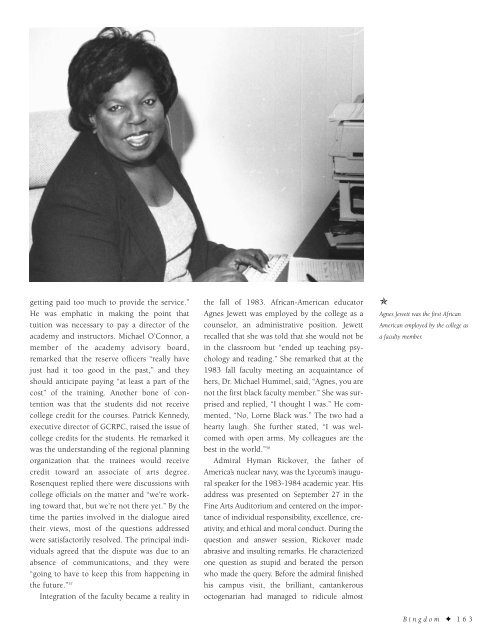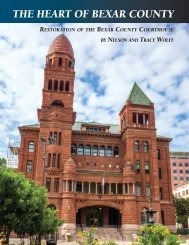The Victoria College, 1925-2000: A Tradition of Excellence
A history of the Victoria College of Victoria, Texas, published to commemorate the institution's 75th anniversary.
A history of the Victoria College of Victoria, Texas, published to commemorate the institution's 75th anniversary.
- No tags were found...
You also want an ePaper? Increase the reach of your titles
YUMPU automatically turns print PDFs into web optimized ePapers that Google loves.
getting paid too much to provide the service.”<br />
He was emphatic in making the point that<br />
tuition was necessary to pay a director <strong>of</strong> the<br />
academy and instructors. Michael O’Connor, a<br />
member <strong>of</strong> the academy advisory board,<br />
remarked that the reserve <strong>of</strong>ficers “really have<br />
just had it too good in the past,” and they<br />
should anticipate paying “at least a part <strong>of</strong> the<br />
cost” <strong>of</strong> the training. Another bone <strong>of</strong> contention<br />
was that the students did not receive<br />
college credit for the courses. Patrick Kennedy,<br />
executive director <strong>of</strong> GCRPC, raised the issue <strong>of</strong><br />
college credits for the students. He remarked it<br />
was the understanding <strong>of</strong> the regional planning<br />
organization that the trainees would receive<br />
credit toward an associate <strong>of</strong> arts degree.<br />
Rosenquest replied there were discussions with<br />
college <strong>of</strong>ficials on the matter and “we’re working<br />
toward that, but we’re not there yet.” By the<br />
time the parties involved in the dialogue aired<br />
their views, most <strong>of</strong> the questions addressed<br />
were satisfactorily resolved. <strong>The</strong> principal individuals<br />
agreed that the dispute was due to an<br />
absence <strong>of</strong> communications, and they were<br />
“going to have to keep this from happening in<br />
the future.” 57<br />
Integration <strong>of</strong> the faculty became a reality in<br />
the fall <strong>of</strong> 1983. African-American educator<br />
Agnes Jewett was employed by the college as a<br />
counselor, an administrative position. Jewett<br />
recalled that she was told that she would not be<br />
in the classroom but “ended up teaching psychology<br />
and reading.” She remarked that at the<br />
1983 fall faculty meeting an acquaintance <strong>of</strong><br />
hers, Dr. Michael Hummel, said, “Agnes, you are<br />
not the first black faculty member.” She was surprised<br />
and replied, “I thought I was.” He commented,<br />
“No, Lorne Black was.” <strong>The</strong> two had a<br />
hearty laugh. She further stated, “I was welcomed<br />
with open arms. My colleagues are the<br />
best in the world.” 58<br />
Admiral Hyman Rickover, the father <strong>of</strong><br />
America’s nuclear navy, was the Lyceum’s inaugural<br />
speaker for the 1983-1984 academic year. His<br />
address was presented on September 27 in the<br />
Fine Arts Auditorium and centered on the importance<br />
<strong>of</strong> individual responsibility, excellence, creativity,<br />
and ethical and moral conduct. During the<br />
question and answer session, Rickover made<br />
abrasive and insulting remarks. He characterized<br />
one question as stupid and berated the person<br />
who made the query. Before the admiral finished<br />
his campus visit, the brilliant, cantankerous<br />
octogenarian had managed to ridicule almost<br />
✯<br />
Agnes Jewett was the first African<br />
American employed by the college as<br />
a faculty member.<br />
Bingdom ✦ 163















